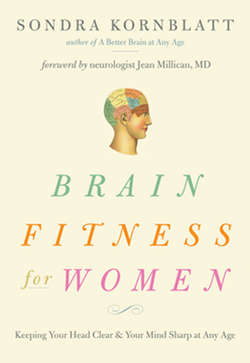Читать книгу Brain Fitness for Women - Sondra Kornblatt - Страница 38
На сайте Литреса книга снята с продажи.
Mom's Brain After Baby
ОглавлениеSkipping right through childbirth (let's thank epidurals and the amnesiac hormone oxytocin, which gets released during labor), let's dive into a mother's postpartum brain.
The baby blues are not uncommon; 60 to 80% of new moms experience them after childbirth. The blues are unexpected sadness, crying, irritability, restlessness, and anxiety. They are similar to the pregnancy blues, but many women are jarred by having them while they have a new baby.
It makes sense that these blues occur when you consider all the changes new moms experience: a precipitous drop in estrogen and progesterone, fatigue from childbirth, the round-the-clock demands of the newborn, disappointment or guilt that things may not have gone as planned, the adjustment to breastfeeding, frustration about the still-poochy tummy, a messier house, and new negotiations with your partner.
Most times, baby blues fade in a couple of weeks as your body adjusts to the hormones and your new life. You may also learn how to function with less or interrupted rest. Meanwhile, it may help to:
Ask for and accept help, even if it means adjusting your usual standards and habits a bit.
Focus on what's really important. While a clean house may be relaxing, the effort to get it clean and keep it that way may just be too much for now. You, your baby, and your family are top of the list. Everything else is extra.
Eat well. Keep cut veggies, fruit, cheese, sunflower or pumpkin seeds, and trail mix available. Eating these nutritious foods helps your blood sugar and mood.
Stay hydrated, especially if you're nursing.
Take care of yourself. Sleep when the baby's sleeping.
Be kind to yourself. Being a parent means constant learning, mistakes, and growing—not perfection. If you constantly compare yourself to what you should do or wish you could do, you miss out. Parenthood is a journey, not a destination, as they say.
Get dressed, so you like how you look.
Make sure your thyroid is still functioning well.
Treat yourself. A Netflix movie, ordering dinner with your partner while the baby sleeps, a long bath—do whatever helps you feel renewed.
Have a good laugh or good cry. It doesn't matter what you laugh or cry about. Both crying and laughing release tension from your body and change your perspective. Sad movies and comedies can trigger a good sob or deep belly laugh.
Go somewhere, at least once a day. Even a walk in the park, a visit to a mom's group, or a trip to the mall refreshes your view.
Move. From postpartum exercise or yoga to an exercise video, a walk, or dancing to old Madonna songs—all types of exercise help balance your hormones, boost your brain, and soothe your emotions.
When the baby blues don't abate within a month after childbirth and/or the symptoms seem to get worse, it's likely you have postpartum depression (PPD), which affects between 8 and 20% of women after pregnancy. Postpartum depression is a serious condition that can interfere with moms, the mom-baby relationship, and the family.
Postpartum depression can start soon after delivery or up to a year later, though it often occurs within the first four weeks after delivery. How long it lasts is different for every woman. Some women feel better in a few weeks; others may feel depressed for months or even a year or longer.
Symptoms are more pronounced than those of the baby blues and may include crying; irritability; insomnia; extreme fatigue; eating problems; persistent feelings of sadness, hopelessness, or helplessness; memory loss; and an inability or lack of desire to take care of yourself and/or your baby. Sometimes women suffering from PPD experience panic, mania, or even hallucinations or obsessive-compulsive thoughts or behaviors. In extreme cases, PPD can put the mom and baby's lives at risk.
Women who have a history of depression or anxiety have a higher chance of developing postpartum depression. So do those who abuse alcohol or other substances, smoke, experience a stressful pregnancy or stressful circumstance during pregnancy, are teens, had poor support or trauma in childhood, and/or get little support as a mother. These life experiences, say Sichel and Watson Driscoll in Women's Moods, Women's Minds, can set the stage for an emotional earthquake such as PPD or during other stressful hormonal events.98
If your baby blues don't improve, get worse, or simply interfere with daily life or cause concern, get support from your life partner and friends, and talk to a medical practitioner to sort out whether or not PPD may be making this time difficult.
